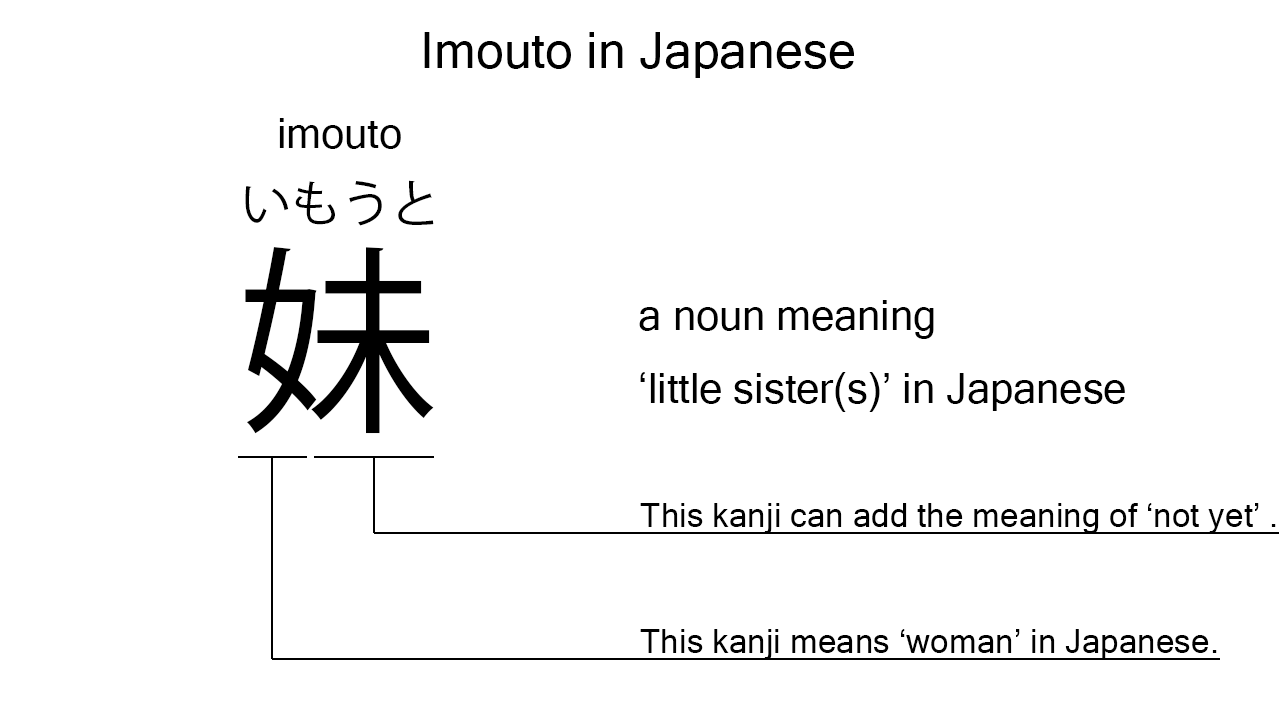What does “imouto” mean in Japanese?
Native speakers use imouto to mean a ‘little sister’ in Japanese. Perhaps, some Japanese learners know this word as it is sometimes used in Japanese conversations. In this blog post, however, I’m explaining this word in detail based on its kanji character. And also, I’m explaining how to use it through example sentences. My explanations would help Japanese learners understand imouto more clearly. Then, let’s get started!
Contents
Definition and meanings of “imouto”
Let me start with the definition and meanings of imouto.
- imouto – 妹 (いもうと) : a noun meaning a ‘little sister’ or ‘younger sister’ in Japanese. This can also work as plural. Learn more about Japanese plural.
The definition and meanings are simple and clear. To understand this noun more clearly, however, let me explain its kanji character in detail.
Imouto in kanji
The kanji character of imouto consists of the following two parts:
- 女 : a kanji character used to mean a ‘woman’ in Japanese.
- 未 : a kanji character often used as a prefix to add the meaning of ‘not yet’. This kanji can also be found in other words like mirai.
From these two kanji characters, we can understand that imouto literally means ‘not yet a woman’ in Japanese. This literal interpretation is not completely in line with the actual meanings, but still very understandable, I think. Little sisters will never be women old enough for their older siblings.

When we meet new kanji characters, we should check their parts in detail to understand their meanings clearly and deeply. In many cases, kanji parts tell us a lot about the meanings of the characters they form. Actually, here, we could get the better understanding of imouto through the detailed kanji check above.
So far, I’ve explained the definition and meanings of imouto together with its kanji parts. Then, let me explain how to use it through the example sentences below.
How to say “little sister” in Japanese
boku no imouto wa totemo kawaii – 僕の妹はとても可愛い (ぼくのいもうとはとてもかわいい)
My little sister is very cute.
Below are the new words used in the example sentence.
- boku – 僕 (ぼく) : a pronoun meaning ‘I’ in Japanese. This is used mainly by boys and young males.
- no – の : a case particle used after a noun or pronoun to make its possessive case. In the example, this is used after boku to make its possessive case, boku no, which means ‘my’ in Japanese.
- wa – は : a binding particle working as a case marker or topic marker. In the example, this works after boku no imouto to make the subject in the sentence.
- totemo – とても : an adverb of degree meaning ‘very’, ‘much’, ‘so’, or such in Japanese. In the example, this works before kawaii to emphasize its meaning.
- kawaii – 可愛い (かわいい) : an i-adjective meaning ‘cute’ in Japanese.
This is a typical usage of imouto. In this example, it works as a part of the noun phrase, boku no imouto, which means ‘my little sister’ in Japanese.
Another example of “imouto”
watashi wa kyonen imouto to tokyo ni it ta – 私は去年妹と東京に行った (わたしはきょねんいもうとととうきょうにいった)
I went to Tokyo last year with my little sister.
Below are the new words used in the example sentence.
- watashi – 私 (わたし) : a pronoun meaning ‘I’ in Japanese.
- kyonen – 去年 (きょねん) : a noun meaning ‘last year’ in Japanese. This can also work as an adverb almost anywhere in a sentence. In the example, this works as an adverb in the middle of the sentence to mean ‘last year’ in Japanese.
- to – と : a case particle used to say with whom someone does something. In the example, this is used after imouto to say with whom the speaker went to Tokyo last year.
- tokyo – 東京 (とうきょう) : a noun meaning ‘Tokyo’ in Japanese.
- ni – に : a case particle used to say where someone or something goes. In the example, this is used after tokyo to indicate where the speakers went.
- it – 行っ (いっ) : one conjugation of the verb, iku, which means ‘to go’ in Japanese. In the example, it has been conjugated for the better connection with its following word.
- ta – た : an auxiliary verb used after a verb, adjective, or auxiliary verb to make its past tense form. In the example, this is used after it to make its past tense form, it ta.
This is another example of imouto. In this example, it works together with the case particle, to, to mean ‘with my little sister’ in Japanese. When we want to mean a ‘little sister’ in Japanese, anyway, this noun is always a very good option.
Summary
In this blog post, I’ve explained the definition and meanings of imouto in detail based on its kanji character. And also, I’ve explained how to use it through the example sentences. Let me summarize them as follows.
- imouto – 妹 (いもうと) : a noun meaning a ‘little sister’ or ‘younger sister’ in Japanese. This can also work as plural. Two parts of this kanji character literally mean ‘not yet a woman’ in Japanese. This literal interpretation is not completely in line with the actual meanings, but still very understandable, I think. Little sisters will never be women old enough for their older siblings.
Hope my explanations are understandable and helpful for Japanese learners.
Leave a Reply